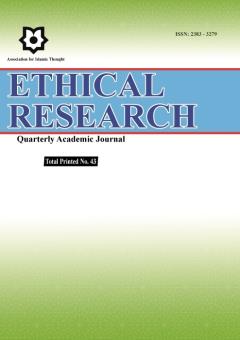Bioethics and its relationship with cryonics from a jurisprudential- legal perspective
Subject Areas : Ethics and Islamic Education
1 -
Keywords: Cryonics, Bioethics, Permission and impermissibility, jurisprudential-legal consequences, ]human simulation.,
Abstract :
Mankind is always in the pursuit of immortality, and medical science is one of the sciences that thinks about human health and immortality. One of the emerging issues in medicine is freezing and frostbite. By freezing the human body, this science tries to revive the human body after several years, and there are also centers in some countries of the world that promise to freeze the human body and bring it back to life after many years. One of the most important ways to create common standards of biomedicine is the unification of the principles of biomedicine in the framework of human rights. Assuming the role that human rights play in this global ethic of cultural pluralism, it seems like an appropriate strategy. In addition to the generally emerging standards, there is a broad consensus on the emergence of two specific issues: cell chain intervention and human cloning. This article is prepared in a descriptive-analytical method and deals with the issue of permissibility and impermissibility of this method and also, if it is permissible or not, deals with its legal jurisprudential effects and consequences. The result is that with the assumption of permission and the presumption that the frozen person is alive, the effects of death, marriage, execution of will, expiration of debts and contracts or contracts are not enforceable, and in similar circumstances such as absenteeism, including the appointment of a trustee. Those who believe in the impermissibility of the verses "prohibition of induction in death" and "sanctity of self-murder" in the tradition have argued for narrations in this field as well as for the narrations of impermissibility of self-harm as well as the rule of reason. Those who believe in the permissibility of the verse "I am the resurrected, but I am the resurrected of all people" in the Sunnah have relied on narrations such as "no harm and no harm in Islam" and also by the rule of reason. The arguments for a cryonic license are stronger than the arguments for a non-license when the conditions are met.
قرآن کریم
ثقفی تهرانی، محمد (1398)، تفسیر روان جاوید، تهران، انتشارات برهان، چاپ سوم.
حر عاملی، محمدبن حسن، (1370)، وسایل الشیعه، بیروت، دار الاحیاء التراث العربی.
جوادی آملی، عبدالله، (1388) ش، تفسیر تسلیم، ج 18، قم، مرکز نشر اسرا ء
صفایی، حسین، (1386) ش، حقوق مدنی و تطبیقی، تهران، نشر میزان
قرائتی، محسن،(1383) ش، تفسیر نور، تهران، مرکز فرهنگی درسهایی از قرآن، چاپ یازدهم
کلینی، محمد بن یعقوب (1361)، الکافی، چاپ دوم، تهران، اسلامی.
مکارم شیرازی، ناصر، (1369)، موضوع فقهی انجماد انسان، دار الکتب اسلامی.
مکارم شیرازی، ناصر، (1393)، معاد و جهان پس از مرگ، انتشارات سرود، چاپ نهم.
مکارم شیرازی، ناصر، (1386)، برگزیده تفسیر نمونه و جمعی از فضلا، تنظیم احمد علی بابایی، تهران: دارالکتب اسلامی.
بصیر زاده، شهناز، ادیبی سده، سارا (1395)، بررسی فقهی و حقوق احوال شخصیه در انجماد زیستی، مجله مطالعات حقوق، زمستان.
Cron R. (2020) is cryonics on Ethical means of life extension? Devon, south west England: university of Exeter, 2014. P.1-29
Huxtable R. (2019) cryonics in the courtroom: which Interests? Which Interests Whose Interests? Medical low review 2018, 26 (3) 476-499
Smith G, Hall C. (2018) cryonic suspension and low. Columbus school of law-3 1986: 17(1): 1-.7
Ettinger R (2017) the prospect of immortality. No place: H Doubleday & Co 4 1964. P. 93-95
Nebraska Press Onora O'Neill, Autonomy and Trust in Bioethics, Cambridge University Press.


